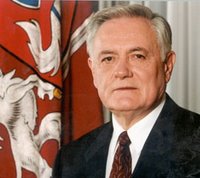Between Baltic and Black Seas
 A few hours ago President Adamkus of Lithuania opened the first part of the meetings here in Vilnius on "common vision for common neighbourhood".
A few hours ago President Adamkus of Lithuania opened the first part of the meetings here in Vilnius on "common vision for common neighbourhood".He called for an open and fresh discussion on how to establish an agreed strategic perspective on how to support and consolidate democracy and freedom in Europe's East.
For him, "the fate of democratic consolidation in Europe's East is the greatest issue in trans-Atlantic politics." Sitting here in Vilnius, with the most near-by other European capital being Minsk in authoritatian Belarus, that is a most understandable position.
But how should we proceed in consolidating democratic structures between the Baltic and the Black Sea? And President Adamkus widened the perspective by talking also about a vision for the area between the Adriatic and Caspian Seas.
These are the questions that will be the focus of the discussions here.
The meeting here in Vilnius can be seen as a third-generation effort to assist in the democratic transformation of the East of Europe.
The first generation was really the so-called Visegrad Group of Central European countries that was formed already in 1991 trying to advocate them being included in the European Union.
The second generation was the so called Vilnius Ten, based on the ten countries that meet here in Vilnius in May 2000 in order to advance the issues of their inclusion in both NATO and the European Union.
With the enlargement of both the European Union and NATO to these areas now two years old, attention shifts towards the wider East and the issues of democracy and security there.
It's to a large extent a question of the political and economic future of Russia. But it's equally a question of the political and economic future of the areas in between Russia and the European Union.
And those are the issues on which President Adamkus is calling for a clear strategic vision.
Easy in theory - somewhat more complicated in practice.
Just one example uppermost in the minds of many dealing with this part of Europe.
There seems to be little progress in establishing a new government after the elections in Ukraine. In principle, agreement has been reached on the reforming of some sort of Orange coalition, but in practive contradictions on core issues are blocking progress.
There is a significant risk of a deepening constitutional crisis on the Dnepr.
And without a solid government in Kiev driving reforms there is a big strategic hole in any strategy for democracy and security between the Baltic and the Black Seas.
But we will probably hear more from President Yushenko when he arrives here in Vilnius later today. Tomorrow he will be in the panel on the summit that I'm moderating.


<< Home